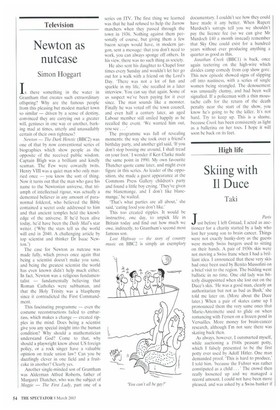Newton as nutcase
Simon Hoggart
Is there something in the water in Grantham that creates such extraordinary offspring? Why are the famous people from this pleasing but modest market town so similar — driven by a sense of destiny, convinced they are carrying out a greater will, geniuses in one way or another, barking mad at times, utterly and unassailably certain of their own rightness?
Newton — The Dark Heretic (BBC2) was one of that by now conventional series of biographies which show people as the opposite of the received public wisdom. Captain Bligh was a brilliant and kindly seaman. The Few were cowardly twits. Henry VIII was a quiet man who only married once — you know the sort of thing. Now it turns out that the man who gave his name to the Newtonian universe, that triumph of intellectual rigour, was actually a demented believer in any amount of paranormal folderol, who believed the Bible contained a secret code addressed to him and that ancient temples held the knowledge of the universe. If he'd been alive today, he'd have been the Daily Mail's star writer. ('Why the stars tell us the world will end in 2040. A challenging article by top scientist and thinker Dr Isaac Newton.') The case for Newton as nutcase was made fully, which proves once again that being a scientist doesn't make you sane, and being the greatest scientist the world has even known didn't help much either. In fact, Newton was a religious fundamentalist — fundamentally believing that Roman Catholics were subhuman, and that the Holy Trinity was a blasphemy since it contradicted the First Commandment.
This fascinating programme — even the costume reconstructions failed to embarrass, which makes a change — created ripples in the mind. Does being a scientist give you any special insight into the human condition? Why should a mathematician understand God? Come to that, why should a playwright know about US foreign policy, or a rock singer have a valuable opinion on trade union law? Can you be dazzlingly clever in one field and a fruitcake in another? Clearly yes.
Another single-minded son of Grantham was Alderman Alfred Roberts, father of Margaret Thatcher, who was the subject of Maggie — The First Lady, part one of a series on ITV, The first thing we learned was that he had refused to help the Jarrow marchers when they passed through the town in 1936. Nothing against them personally of course, but giving them a few bacon scraps would have, in modern jargon, sent a message: that you don't need to work, you can always sponge off others. In his view, there was no such thing as society.
He also sent his daughter to Chapel four times every Sunday and wouldn't let her go out for a walk with a friend on the Lord's Day. 'There was not a lot of fun and sparkle in my life,' she recalled in a later interview. You can say that again. Some of us suspect we've been paying for it ever since. The man sounds like a monster. Finally he was voted off the town council, and even half a century later, an aged Labour member still smiled happily as he recalled the event. 'We wanted him out, you see ... '
The programme was full of revealing moments: the way she took over a friend's birthday party, and another girl said, If you don't stop bossing me around, I shall tread on your foot.' I wonder if Ken Clarke made the same point in 1990. My own favourite Thatcher quote came later, and might even figure in this series. As leader of the opposition, she made a guest appearance at the Commons Press Gallery children's party and found a little boy crying. 'They've given me blancmange, and I don't like blancmange,' he wailed.
'That's what parties are all about,' she said, 'eating food you don't like.'
This too created ripples. It would be instructive, one day. to unpick life in Britain today and find out how much we owe, indirectly, to Grantham's second most famous son.
Lost Highway — the story of country, music on BBC2 is simply an exemplary
documentary. I couldn't see how they could have made it any better. When Rupert Murdoch's satraps tell you we shouldn't pay the licence fee (so we can give Mr Murdoch £40 a month instead) remember that Sky One could exist for a hundred years without ever producing anything a quarter as good as this.
Jonathan Creek (BBC1) is back, once again teetering on the high-wire which divides camp comedy from cop show gore. This new episode showed signs of slipping off into nastiness, with a series of single women being strangled. The denouement was unusually clumsy, and had been well signalled. If a policeman with a thin moustache calls for the return of the death penalty near the start of the show, you know he's going to be the killer. It's not hard. Try to keep up. This is a shame, because Creek has been consistently as light as a ballerina on her toes. I hope it will soon be back on its feet.


































































 Previous page
Previous page